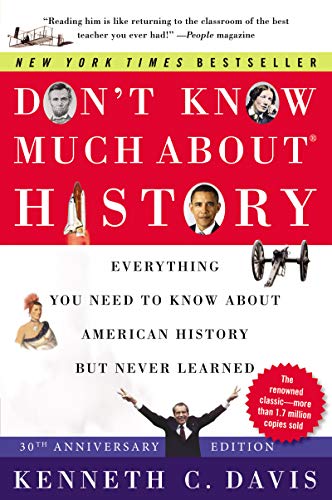Exclusive to Smerconish.com

Moving swiftly on its first day in office, the Biden administration reversed a slew of policies established by the previous administration. By order, President Biden re-entered the Paris climate agreement, reversed the Muslim travel ban, and redirected the nation’s immigration policy. He also had the “1776 Report” removed from the White House website.
What 1776 Report? Don’t know about it? You should.
Commissioned by the outgoing administration, the report aimed to establish a blueprint for what our nation’s schools should teach in history class.
Now I am all in for history education. My entire career has been about eradicating “historical illiteracy.” That’s why I wrote Don’t Know Much About History.
But the “1776 Report” was a transparent White House effort to whitewash history. Free of footnotes, lacking documentation, and unsigned – as well as loose with facts – it was a piece of propaganda insultingly issued on Martin Luther King, Jr. Day. It took particular aim at diminishing the role of slavery in our national past. It also equated America’s Progressive movement with Mussolini’s fascism.
For those who aren’t aware, the “1776 Report” was specifically created to rebut the award-winning “1619 Project” issued by the New York Times in 2019. That undertaking sought to recast American history through the lens of the first Africans sold into servitude in colonial Virginia in 1619. Though it had both its flaws and critics, the “1619 Project” was an important corrective that delved into the “hard history” of slavery’s role in shaping the nation’s foundation and creating America’s deep racial divide over four centuries.
Like many historians and teachers, I applauded its intent and scope. As I have written, America was “conceived in liberty” but born in shackles. That is an uncomfortable truth too long obscured.
So, while we say good riddance to the dangerous propaganda of the “1776 Report,” we must also recognize another fact – whitewashing history is not new. It has been around for centuries –for many reasons.
First, the winners write history. In the case of the “Exceptional” America narrative taught for centuries, the winners were white, male, Anglo-Saxon—and self-serving. They crafted a foundation myth about the English coming to Virginia and Massachusetts in the 1600s, not the French and the Spanish who were in Florida decades earlier, killing each other over religion.
English mercenary Captain John Smith’s Jamestown code of “If you don’t work, you don’t eat” evolved into the backbone of a “Protestant Ethic” parable that negated the existence of slavery. Neither did they tell us that “Squanto,” legendary rescuer of the Pilgrims, spoke English because he had been enslaved by an English sea captain.
The sanitizing of history is linked to a second, equally onerous motive. School books have long offered a watered-down, incomplete, or flat-out fabricated “cherry tree” version of history designed to inspire patriotism and pride. Flawless white men stood out as heroes in mythic stories, while the roles of women, Native Americans, and Black people were wiped away.
This was the benign vision presented in the “1776 Report,” with serious errors in fact and judgment. While it put a gloss on slavery, the report never mentions Native Americans, with the exception of including Jefferson’s reference to “merciless Indian savages” in the Declaration of Independence.
When I wrote Don’t Know Much About History some thirty years ago, it made sense to tell the whole story, warts and all. Of Columbus as an intrepid explorer who accidentally stumbled across a “New World” where millions of indigenous people already lived— and then enslaved, crucified, and decimated them. Of the English going to war with the Native Americans shortly after the mythic Thanksgiving “happy meal.” Of presidents as slaveholders. Of a land called a melting pot, but filled with ethnic, religious, and racial ghettos.
These truths are not “self-evident. But they are important. They are also a good deal more interesting than the sanitized “1776 Project” version.
And, in the end, what kind of nation can’t handle the truth?
______________________________________________________________________________________________________________________







